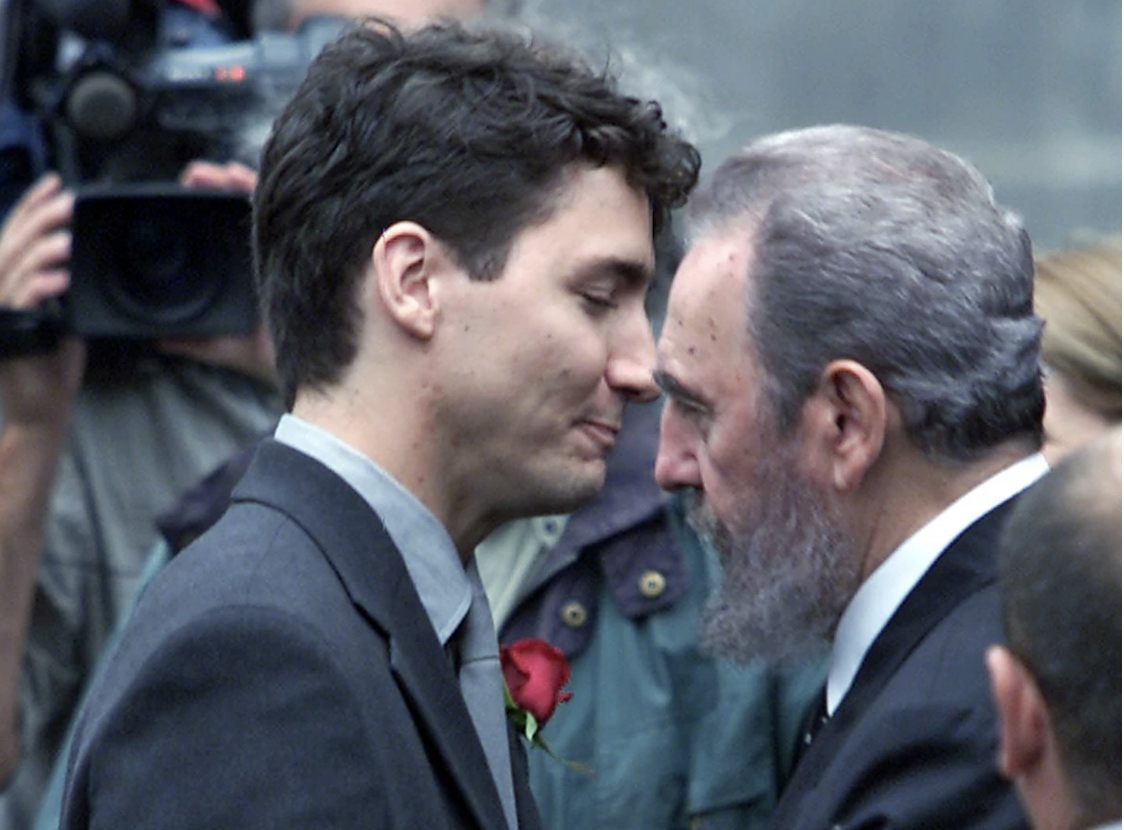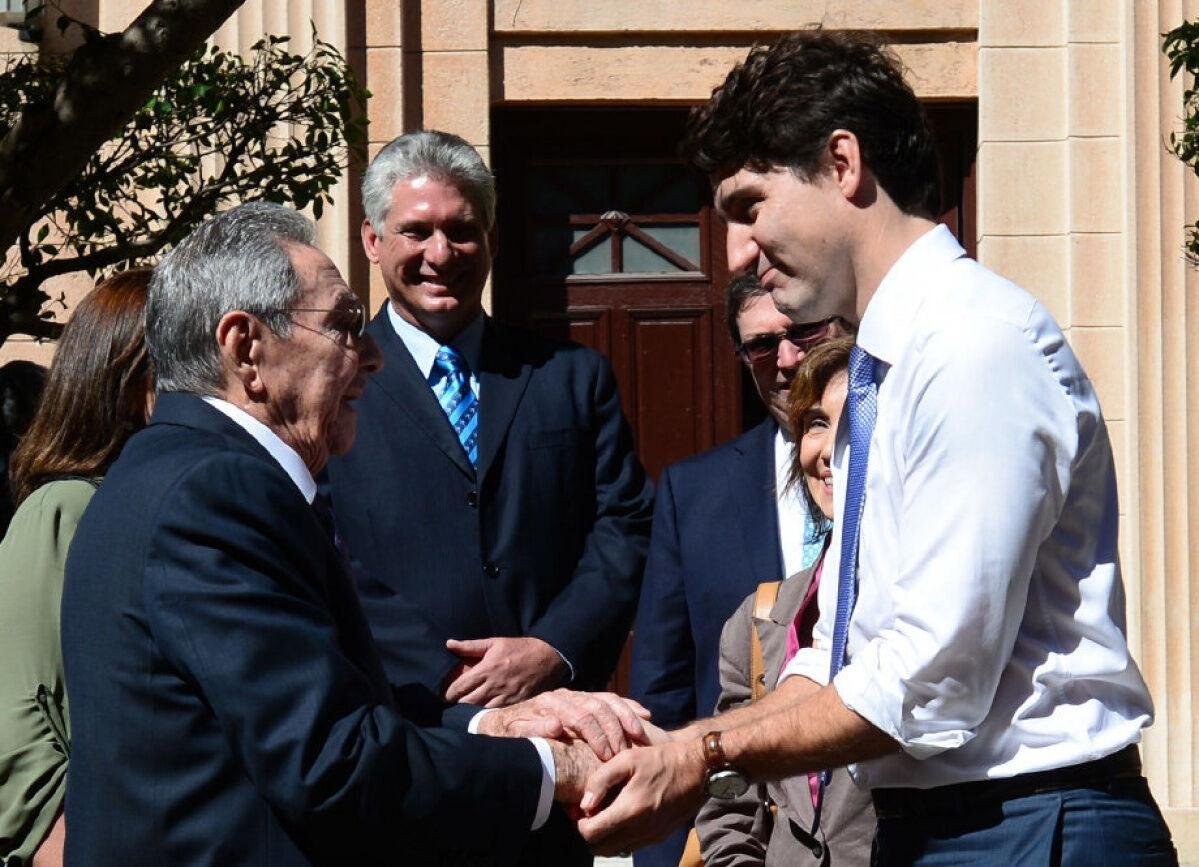Trudeau must change its policy on Cuba, which is leveraged by China, Russia, Iran
Prime Minister Justin Trudeau gets a hug from Cuban dictator Fidel Castro prior to the funeral of Pierre Trudeau in Montreal, Oct. 3, 2000. (Photo/The National Post).
PHOTOS from left to right. Justin Trudeau shakes hands with Raúl Castro at the University of Havana on November 16. 2016 during his official visit to Cuba. (Photo/Toronto Star). At a dinner for the Diplomatic Corps in December 2022, Trudeau shakes hands with Héctor Igarza Cabrera, former ambassador of the Cuban regime in Canada.
This article originally appeared in the Bureau
By Michael Lima, February 28, 2024
Since Prime Minister Justin Trudeau took office in 2015, Canada's foreign policy towards Cuba has been marked by inconsistency and a lack of action in defending the human rights of a people whom the Canadian government considers "friends."
Despite Trudeau's claims to defend democracy in other parts of the world, such as Venezuela, Belarus, Ukraine, his government does not uphold the same standard when it comes to Cuba.
Numerous opportunities to stand with the Cuban people have been missed.
In November 2018, the Canadian government opposed eight measures in the Human Rights Council aimed at holding the Cuban regime accountable for widespread human rights violations.
Furthermore, after the unprecedented wave of repression following the pro-democracy protests of July 2021, the Canadian government, despite making comments in solidarity with the people of Cuba, failed to take substantive action to counter the repression against tens of thousands of Cubans.
Given the unprecedented levels of repression within Cuba and the global landscape characterized by the clash between democracy and authoritarianism, it is crucial for Canadian foreign policy towards Cuba to undergo urgent reformulation.
This necessitates implementing measures to counteract the Cuban regime's active obstruction of democratic progress in the Americas and its alignment with authoritarian powers such as Russia and China.
With over 1,000 political prisoners, Cuba stands as the leading jailer of political dissidents in the Americas.
Presently, levels of repression against activists, journalists, artists, and independent thinkers are at their highest in decades.
Confronted with this systemic violence, the Cuban people live in a state of defencelessness due to the absence of an impartial judicial system and independent media.
Despite the pervasive repression, thousands of protests have erupted across the island since September 2020, signalling the resurgence of a culture of dissent.
These developments underscore the urgent need for active international solidarity.
Cuba's dictatorship shamelessly aligns itself with Russia, actively participating in the asymmetric war against Ukraine by extending diplomatic, propagandistic, and military support to the Russian regime.
Within Cuba, state-controlled media parrots Kremlin propaganda, aiding in obscuring the atrocities committed by the Russian regime in Ukraine.
This disinformation campaign reaches over 60 million people globally through the Cubavision International signal on five satellites.
Despite Canada's condemnation of disinformation regarding the Ukrainian conflict, the Canadian Radio-television and Telecommunications Commission (CRTC) still permits the distribution of Cubavision International within Canada.
The Cuban regime has actively cultivated a pro-Russian and anti-Ukrainian coalition in the Americas by leveraging its extensive propaganda apparatus and influence over left-wing parties and associated movements within the São Paulo Forum — an influential network spanning multiple American countries.
One of the significant negatives of this influence, compounded by the reluctance of other populist governments in the region to overtly support Ukraine due to their sympathies for the Putin regime, under the guise of neutrality, is the absence of military assistance from any Latin American nation to Ukraine.
Moreover, Cuba, alongside Venezuela, Nicaragua, and other authoritarian and anti-American states in the region, vetoed an invitation from Spanish President Pedro Sanchez to Ukrainian President Volodymyr Zelensky for participation in the III European Union and the Community of Latin American and Caribbean States (CELAC) Summit in July 2023.
Meanwhile, the presence of China's spy base in Cuba, confirmed by U.S. intelligence reports, poses a significant security threat to the free world.
Additionally, an investigative report by Insider magazine reveals that Russia has been reactivating the Lourdes Radio Electronic Center in Cuba since 2014, equipping it with state-of-the-art spy technology.
Such a listening post not only jeopardizes the security of the United States, but as claimed by Russian intelligence specialists themselves, also possesses the technological capability to extend its surveillance range to Canada.
Moreover, Cuba's backing of authoritarian regimes in the Americas poses a barrier to the region's democratic advancement.
A clear instance is seen in Venezuela.
As detailed in the U.N. Fact Finding Mission report of September 2022, the Cuban regime actively engaged in restructuring Venezuela's intelligence and counterintelligence services, providing training to their personnel.
Human rights organizations have documented how this training included the instruction of torture techniques subsequently used on political detainees.
Furthermore, testimony given to the U.S. House Foreign Affairs Subcommittee on Western Hemisphere suggests that the Cuban regime, alongside Russia and Venezuela, may have participated in social media campaigns utilizing "media bots," "troll farms," and other strategies aimed at spreading disinformation.
These actions seek to undermine trust in democratic institutions in countries such as Colombia and exacerbate polarization throughout the hemisphere.
However shameful its repression, the Cuban regime often escapes significant international condemnation for its alliances with regimes like Russia and China.
Thus far, it's been the Cuban people who have borne the brunt of challenging the dictatorship.
When hundreds of thousands took to the streets in 2021, they effectively shattered over six decades of propaganda myth-making regarding widespread support for the regime.
Meanwhile, Canada's foreign policy stance towards Cuba appears inconsistent.
While Canada imposes sanctions on individuals in regimes like Belarus for their support of Russia in the invasion of Ukraine, it hesitates to take similar actions against other key allies of Putin, such as the Cuban regime.
More broadly, despite enforcing targeted sanctions on officials from over 20 dictatorships worldwide, Ottawa has yet to hold Cuban officials accountable for the atrocities committed during the repression of July 2021.
In response to formal requests from Democratic Spaces, Global Affairs Canada should be implementing robust sanctions targeting the most egregious human rights violations within Cuba's repressive apparatus.
Instead, Ottawa's approach appears to prioritize trade over democracy and human rights.
Both the Canadian government and private sector directly contribute to sustaining the regime through tourism, channeling substantial revenues into GAESA, the Cuban military conglomerate that controls the tourism industry and other lucrative sectors of the economy.
Ottawa could exert greater influence by openly addressing Cuba's human rights violations rather than discussing them privately with regime officials.
Despite a decline in its democratic score in the most recent Democracy Index 2023 under Prime Minister Justin Trudeau, Canada still ranks among the world's better-ranked democracies.
It is well-positioned to introduce measures and resolutions in international forums to hold the Cuban regime accountable for its systematic human rights violations.
The first essential step in re-evaluating Canadian foreign policy is to heed the voices of those inside Cuba advocating for democracy.
It is time to break away from Canada's historical bias of predominantly listening to corporations, scholars, and organizations invested in trade relations with the Cuban regime.
Addressing this issue and others related to Cuba-Canada relations, Manuel Cuesta Morua — a Cuban dissident leader, scholar, and political activist whom I interviewed in October 2023 concerning Cuba-Canada relations — questioned Canada's support for "an autocracy like the Cuban one, when it is clear that autocracies are not appropriate models for generating and fostering well-being within their societies."
Cuesta Morúa urged Ottawa to resume dialogue with representatives of independent civil society organizations in Cuba, as it had done throughout much of the 1990s and 2000s.
There are precedents in publicly defending the human rights of the Cuban people during the government of Prime Minister Stephen Harper.
As a notable example, on February 25, 2010, Lawrence Cannon, who was the Minister of Foreign Affairs at the time, offered condolences to the family of Orlando Zapata Tamayo, a Cuban prisoner of conscience and human rights activist.
Zapata Tamayo had tragically lost his life after an extended hunger strike, protesting the brutality within Cuban prisons.
In a public statement, Cannon called on the Cuban government to release political prisoners and uphold the rights of freedom of expression for the Cuban people.
It is imperative that Canada heeds the voices of the Cuban people.
Cuba requires more than mere humanitarian aid in the form of medicine and food. Its most pressing humanitarian crisis lies in the unjust imprisonment of thousands for exercising their fundamental human rights.
Canada must take the lead in international efforts to secure the immediate release of political prisoners, asserting its moral stance through motions in Parliament and resolutions in international bodies such as the UN Human Rights Council.
It is morally and strategically unjustifiable for the Canadian government to continue considering Cuba as an ally while endorsing tourism and investment in an island controlled by a regime actively collaborating with Russia in the war against Ukraine.
With a substantial diaspora of 1.3 million Ukrainians, Canada's strategic goal should be to support Ukraine and enforce sanctions not only on the Russian regime but also on its allies, particularly the Cuban regime, which is its most important ally in Latin America and the Caribbean.
Standing in solidarity with the Cuban people in their quest for democracy perfectly aligns with Canada's best interests and democratic values.
A free Cuba has the potential to boost trade with Canada and serve as a crucial step in liberating the island from a dictatorial regime.
Historically, Cuba's geographical proximity, about 90 miles from the Florida Keys, has been leveraged by authoritarian regimes like Russia, China, Iran, and others to pursue their global dominance ambitions.
A hemisphere free from the Cuban dictatorship would act as a deterrent to authoritarian expansion, achieving a significant victory for democracy in Latin America.
This would place constraints on Russia and China's influence in the region, countering their plans to reshape the international order and thwarting their efforts against the free world.
History has shown that change doesn't occur without pressure, and the success of any peaceful pro-democracy movement heavily relies on active international solidarity.
The Cuban people's unwavering commitment to freedom and their sacrifices are undeniable. Holding the regime accountable through targeted sanctions, exerting pressure to release all political prisoners, and advocating for the rights of the Cuban people are of utmost importance.
Canada cannot allow silence and inaction to prevail.
Michael Lima is a human rights activist and an expert in Cuban and Latin American history and politics. He has lectured on modern Latin American history, holds a Master’s Degree/Ph.D. candidacy in Latin American History from the University of Toronto, and is the founder of Democratic Spaces, an NGO seeking solidarity in Canada with human rights defenders and civil society in Cuba.


